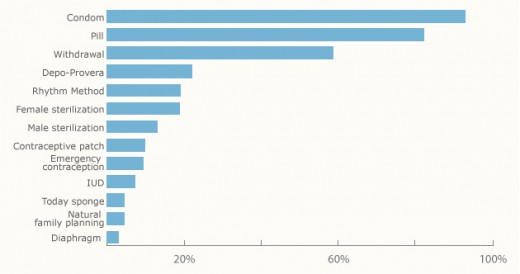Why do women take birth control pills?

In the United States in 2004, approximately 12 million women were actively using oral contraception, or the birth control pill. Over 44 million American woman had used it at some point in their lives. Overall, it has been one of the leading forms of contraception for American women, coming just ahead of female sterilization and condoms.[1]
Most women rely on the birth control pill or other forms of contraception to prevent pregnancy until they reach a point in their lives where they can offer their child or children better financial security and a stable, loving home life. Taken consistently, oral contraceptives are among the most reliable methods of pregnancy prevention, together with other methods of hormonal contraception such as Depo Provera shots or Implanon subcutaneous implants.
Many women, however, take the birth control pill for reasons unrelated or only peripherally related to birth control. For them, the use of hormonal birth control is a medical issue, saving them from painful if not potentially life-threatening health problems.

Medical Uses of the Birth Control Pill
1. Hormonal birth control can regulate menstruation and tame out-of-control hormones.
Menstruation is a natural process, but like any other natural process, it's very complex and depends on every part of it going precisely the way it should. Even slight imbalances can send the whole system spinning out of control.
For example, some women routinely experience heavy menstrual bleeding which leaves them anemic. Anemia causes weakness, fatigue, poor concentration, and shortness of breath. Sometimes it causes edema (swelling of the extremities), chronic heartburn, and vomiting.[2] (Chronic heartburn, by the way, is a major risk factor for esophageal cancer.[3]) Severe anemia can even lead to eventual heart failure. Birth control can reduce the length and amount of menstrual bleeding, thus reducing or eliminating menstrual anemia.[4]
Other women experience particularly severe cramping, migraines, and other pain symptoms related to or triggered by the onset of PMS.[5] Since PMS symptoms can last for a week or more, this can seriously compromise the sufferer's ability to function in day-to-day life. After all, it's not easy to give your all at work or school if you're in constant pain for one week out of every four.
In particular, hormonal birth control is used as a medical treatment for women who suffer from endometriosis, which is the overgrowth of the uterine lining. This lining, meant to nourish and support a growing embryo, normally builds over the course of a menstrual cycle and is shed during menstruation if no pregnancy takes place. In women who suffer from endometriosis, this tissue overgrows and is not easily or fully shed. Sometimes the tissue can even grow outside the uterus, into the ovaries, and extend into the abdominal cavity. This can cause severe menstrual cramps, abdominal pain, irregular and heavy bleeding, and eventual fertility problems.[6] It can also increase the woman's risk of uterine cancer. By preventing menstruation and suppressing the growth of endometrial tissue, however, hormonal birth control can spare sufferers the pain, negative health outcomes, expensive doctor visits, and loss of fertility that result from this condition.

2. Hormonal birth control can regulate hormones when the body is no longer able to.
As described above, the human hormonal system in general and the female hormonal system in particular is delicate. Small imbalances can cause big problems.
Sometimes, however, bad things can happen, and women are left, through illness or accident, unable to regulate or even produce their own hormones at all. Forget imbalance - this is a complete absence of normal hormone production.
In women, the ovaries are the organs most responsible for the regulation of a woman's fertility and menstrual cycles, secreting both estrogen and progesterone.[7]
However, some women do have their ovaries surgically removed for a variety of reasons. These can range from the existence of ovarian cancer, severe ovarian cysts or benign tumors, severe endometriosis, or a preventative oophorectomy (ovarian removal surgery) due to a family history or otherwise increased risk of ovarian or endometrial cancer.[8]This leaves those women without any way to produce estrogen or progesterone within their own bodies. This essentially sends the woman into an early menopause, with all of the associated risks and problems, including a higher risk of heart disease and osteoporosis.[9] Hormonal birth control provides the equivalent to these missing hormones. It does not restore fertility, but it does otherwise allow the woman to lead a relatively normal life.
Radiation and chemotherapy can also damage the ovaries to the point where they will no longer function normally.[10] In these cases, hormonal birth control is recommended in order to re-establish a normal hormonal balance.
Polycystic Ovary Syndrome (PCOS) is another instance of ovaries failing to function properly, this time because the formation of painful cysts disrupts their ability to do so. The symptoms and side effects of PCOS are varied and often severely problematic. Among them are irregular menstrual cycles, severe menstrual cramps, infertility, acne, excessive hair growth, and insulin resistance which can lead to the eventual development of Type 2 diabetes.[11] Furthermore, PCOS puts its sufferers at an increased risk of ovarian[12] and endometrial[13] cancers. Hormonal birth control can address or alleviate all of these symptoms and risks except for infertility and the development of insulin resistance.
Finally, as a less urgent but nevertheless welcome intervention, hormonal birth control not only prevents ovulation but prevents periods or allows women to skip their periods, which may not be a medical issue but certainly is a quality of life one!
Does birth control cause cancer?
No discussion about the medical uses of birth control can go without mentioning its effect on lifelong cancer risks, especially cancers of the reproductive system.
Long-term use of oral contraceptives has been proven to lower the risk of ovarian cancer by up to 50% after five or more years of use. (Though after only one year of use the risk already decreases by 10% to 12%.)[13]
Use of oral contraceptives also decreases the risk of uterine cancer. [14]
However, use of the birth control pill may slightly increase the risk of breast and liver cancer, though the findings in regards to the elevated risk of breast cancer remain controversial.[15]
In addition, while the birth control pill poses no increased risk of heart disease for most women, it does offer an increased risk to women who are over 35, are smokers, or who already have other risk factors for heart disease.[16]
There is also a very small subset of the population who is vulnerable to the development of potentially fatal blood clots, called deep venous thrombosis, due to a genetic mutation known as factor V Leiden thrombophilia. This is an inherited disorder that affects between 3% to 8% of those of European descent[17], and women with the mutation should avoid hormonal forms of birth control in favor of condoms, intrauterine devices, and (if the decision is right for you) sterilization. (Unfortunately, any woman with factor V Leiden and endometriosis has a pretty big problem on her hands.)
As with any form of medicine, the birth control pill has a variety of effects on the body. Most are beneficial. Some are not, though in the case of the birth control pill those are small in comparison to the benefits. As always, it's up to the individual to decide whether or not the medicine's positives outweigh its negatives.
In Closing
The birth control pill is an important tool for women's reproductive health, not only for the prevention of unplanned pregnancies but also as a medical treatment for a variety of diseases and conditions of the female reproductive system.
While there are risks associated with its use, there are also a wide array of benefits, mostly to do with hormone regulation in cases where the body is, for whatever reason, unable to regulate the reproductive hormones on its own.
It can cure women of chronic pain, anemia, and other debilitating conditions. It can also lower their risk for some cancers, and improve their chances of having a successful pregnancy in the future if they suffer from a condition which, untreated, may decrease their fertility in the long term.
The birth control pill does not prevent sexually transmitted diseases. Only condoms or abstinence can do that.
In the end, however, birth control isn't just about pregnancy and its prevention. It's about women's health and welfare, and an important preventative and curative medicine for many diseases of the female reproductive system.
Sources
[1] Use of Contraception and Use of Family Planning Services in the United States
[2] Anemia article at Wikipedia
[3] "Chronic Heartburn Can Increase Risk of Esophagus Cancer" at The New York Times
[4] Medical Uses of the Birth Control Pill at youngwomenshealth.org
[5] Premenstrual Syndrome article at Wikipedia
[6] Endometriosis overview at the pubmed.gov
[7] Ovary article at Wikipedia
[8] Oophorectomy (ovary removal surgery) at the Mayo Clinic
[9] Menopause overview at BBC Health
[10] Medical Uses of the Birth Control Pill at youngwomenshealth.org
[11] Polycystic Ovary Syndrome at the Mayo Clinic
[12] "Epithelial ovarian cancer risk among women with polycystic ovary syndrome" at pubmed.gov
[13] Oral Contraceptives and Cancer Risk Q&A at the National Cancer Institute
[14] Risk Factors For Endometrial Cancer at the American Cancer Society
[15] Oral Contraceptives and Cancer Risk Q&A at the National Cancer Institute
[16] "Does taking birth control pills increase my risk for heart disease?" at womenshealth.gov
[17] Factor V Leiden thrombophilia at the U.S. National Library of Medicine





